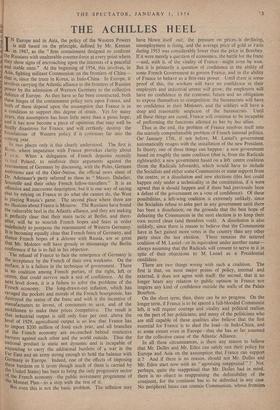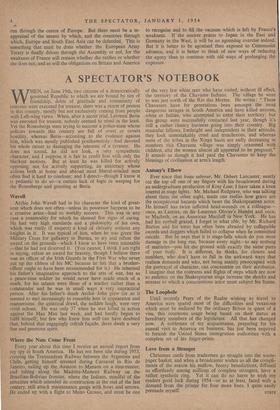THE ACHILLES HEEL
N Europe and in Asia, the policy of the Western Powers t, is still based on the principle, defined by Mr. Kennan -e - in 1947, as the " firm containment designed to confront is the kussians with unalterable counter-force at every point where 11 they show signs of encroaching upon the interests of a peaceful e and stable state." At the beginning of 1954, this involves, in y Asia, fighting militant Communism on the frontiers of China- 1 that is, since the truce in Korea, in Indo-China. In Europe, it involves carrying the Atlantic alliance to the frontiers of Russian ti 5 Power by the admission of. Western Germany to the collective defence of Europe. As they have so far been constructed, both a these hinges of the containment policy turn upon France, and both of them depend upon the assumption that France is in a condition to support this degree of strain. Yet for many Years. this assumption has been little more than a pious hope; and it has now become a piece of optimism that may well be linallY disastrous for France, and will certainly destroy the foundations of Western policy if it continues far into the coming year.
t In two places only is this clearly understood. The first is i 13‘'fin, where impatience with France provokes clarity about When a delegatiOn of French deputies recently I ited Poland, to reinforce their arguments against the rearmament of Germany by discussing, with the Poles, German ambitions east of the Oder-Neisse, the official news sheet of Dr. Adenauer's party referred to them as " Messrs. Daladier, Soustelle and their other French fellow-travellers." It is an offensive and inaccurate description, but it is one way of saying that by relying on France to do what she cannot do, the West is playing Russia's game. The second place where there are no illusions about France is Moscow. The Russians have found the vulnerable heel in the Atlantic alliance, and they are making it Perfectly clear that their main tactic at Berlin, and there- after. will be to nourish French hopes and fears in order indefinitely to postpone the rearmament of Western Germany. It is becoming equally clear that French fears of Germany, and thence French hopes of a detente with Russia, are so great that Mr. Molotov will have grossly to mismanage the Berlin conference if he is to fail in his objective. The refusal of France to face the resurgence of Germany is the acceptance by the French of their own weakness. On the surface, it is a failure in the technique of government. There is no coalition among French parties, of the right, left or centre. that could survive such a test of confidence. . At the next level down, it is a failure to solve the problems of the French economy. The long-drawn-out inflation, which has ravaged the pockets and morals of, the French bourgeoisie, has d?stroyed the status of the franc and with it the incentive of manufacturers to invest, of consumers to save, and of the Middlemen to make their prices Competitive. The result is that industrial output is still only four per cent. above the level of 1929, agricultural output is so low that France has to import $200 million of food each year, and all branches of the French economy are entrenched behind restrictive barriers against each other and the world outside. Thus the national product is static not dynamic and is incapable of expanding to carry the additional burdens of a war in the Far East and an army strong enough to hold the balance with Germany in Europe. Indeed, one of the effects of imposing these burdens on it (even though much of them is carried by the United States) has been to bring the only progressive sector of the French economy—the public investment programme of the Monnet Plan—to a stop with the rest of it. But even this is not the basic problem. The inflation may have blown itself out; the pressure on prices-is declining, unemployment is rising, and the average, price of gold in Paris during 1953 was considerably lower than the price in Bombay.
If it were merely a question of economics, the battle for the franc —and, with it, of the vitality of France—might even be won.
But it is primarily a question of confidence in the ability of some French Government to govern France, and in the ability of France to behave as a first-rate power. Until there is some proof of this, the workers will have no confidence in their employers and industrial unrest will grow; the employers will have no confidence in the economic future and no obligation to expose themselves to competition; the bureaucrats will have no confidence in their Ministers, and the soldiers will have a deep and reasonable suspicion of the bureaucrats. Until all these things are cured, France will continue to be incapable of performing the functions allotted to her by her allies.
Thus in the end, the problem of France resolves itself into the scarcely comprehensible problem of French internal politics.
On' January 17th, if not before. M. Laniel's government automatically resigns with the installation of the new President. In theory, one of three things can happen : a new government based on roughly the same coalition (that is, from the Radicals rightwards); a new government based on a left centre coalition (from the Radicals leftwards). which would have to include the Socialists and either some Communists or some support from the centre; or a dissolution and new elections (this last could happen only under a technicality in the constitution, if it were agreed that it should happen and if there had previously been a defeat of the government on a vote of confidence). Of these possibilities, a left-wing coalition is extremely unlikely, since the Socialists refuse to lake part in any government until there has been a dissolution,-on the grounds that the best hope of defeating the Communists in the next election, is to keep their own record clean (and therefore void). A dissolution is also unlikely, since there is reason to believe that the Communists have in fact gained more votes in the country than any other party since the last election. There remains the tattered coalition of M. Laniel-.-or its equivalent under another name— always assuming that the Radicals will consent to serve in it in spite of their objections to M. Laniel as a Presidential candidate.
There are two things wrong with such a coalition. The first is that, on most major points of policy, internal and external, it does not agree with itself; the second, that' it no longer bears any relation to public opinion in France nor inspires any kind of confidence outside the walls•of the Palais Bourbon.
On the short term, then, there can be no progress. On the longer term, if France is to be spared a full-blooded Communist left, it will require courage and vitality and political realism on the part of her politicians; and many of the politicians who are still capable of these qualities also believe that the first essential for France is to shed the load—in Indo-China, and to some extent even in Europe—that she has so far assumed for the collective cause of the Atlantic Alliance.
In all these circumstances, is there any reason to believe that Mr. Dulles and Mr. Eden can safely rest their policy for Europe and Asia on the assumption that France can support it ? And if there is no reason, should not Mr. Dulles and Mr. Eden start now with an " agonising reappraisal " ? Not.
perhaps, quite the reappraisal that Mr. Dulles had in mind, there is no object in reappraising the defensibility of the continent, for the continent has to be defended in any case No peripheral bases can contain Communism, whose frontiers to recognise and to fill the vacuum which is left by France's weakness. If the answer points to Japan in the East and Germany in the West, it will be an agonising exercise indeed. But it is better to be agonised than exposed to Communist advance, and it is better to think of new ways of reducing the agony than to continue with old ways of prolonging the exposure.











































 Previous page
Previous page